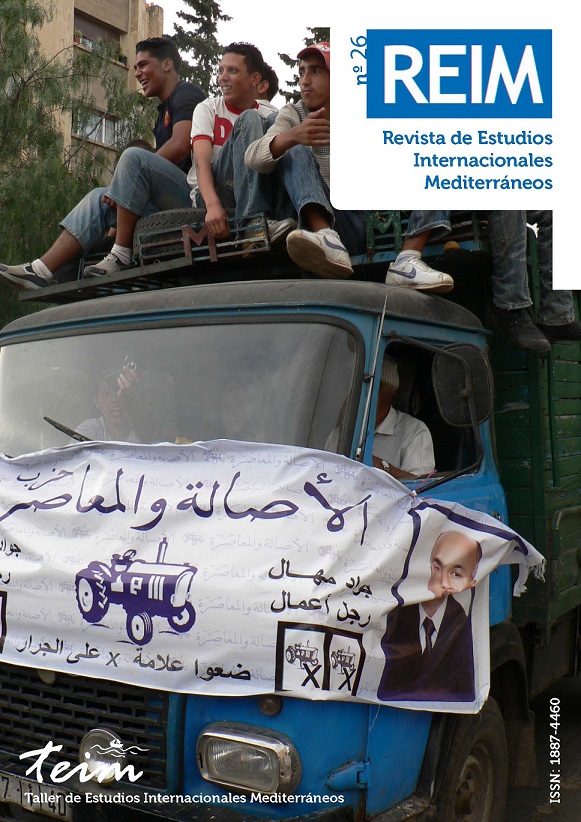“Youth and politics in Morocco: the reasons for institutional non-participation”
Keywords:
Young people, political participation, no-participation, authoritarianism, MoroccoAbstract
Non-participation through formal political institutions is a very strong trend among young Moroccans. The qualitative and quantitative data of an investigation carried out in 2015 and 2016 show that the majority of young people do not participate in political parties and elections. That said, they are not politically apathetic and many of them express a strong interest in politics and a strong sense of agency. The fact that the political interest of young people does not turn into action suggests their disenchantment with the political offer. Although factors such as education, gender and level of political knowledge are important to understand the reasons for participation or non-participation of young people, this article highlights the impact of the centrality of power and established political practices on the existence of this no commitment among young people. In Morocco, the sphere of political participation has expanded since the 1990s. However, in a regime characterized by the centrality of power in the hands of the monarchy / makhzen, a controlled partisan scene and discredited political institutions, citizens are aware of the limits of their influence on public decisions. The field work we have done allows us to conclude that politicians and parties are disconnected from the realities and concerns of young people. In addition, most of the latter feel excluded from the decision-making processes. Even when they participate in discussions and debates within their own organizations, young people feel that their opinions and expectations are not taken into account. Non-participation can be considered as a conscious act that undermines the legitimacy of the system. The separation of young people from the formal sphere of participation and their disenchantment with the political offer can contribute to the long-term use of anti-democratic and non-peaceful means to make their voices heard.
Downloads
References
Albrecht Holger (2008), « The Nature of Political Participation », in Lust-Okar Ellen et Zerhouni Saloua. (eds). Political Participation in the Middle East, Boulder/Londres, Lynne Rienner, pp. 15-32.
Bayat Assef (2002), “Activism and Social Development in the Middle East.” International Journal of Middle East Studies,nº34, pp.1-28.
Bendourou Omar (2007), « La nouvelle loi marocaine relative aux partis politiques », L’Année du Maghreb [En ligne], II | 2005-2006, mis en ligne le 08 juillet 2010, consulté le 1 mars 2019. URL : http://journals.openedition.org/anneemaghreb/126 ; DOI : 10.4000/anneemaghreb.126
Bourqia Rahma, El Harras Mokhtar and Bensaid Driss (1995), Jeunesse estudiantine marocaine, valeurs et stratégies, Rabat, Publications de la Faculté des Lettres et Sciences Humaines.
Bouth John A. et Seligson Mitchell A. (eds.) (1978),Political participation in Latin America. New York: Holmes and Meier.
Desrues et Kirhlani (2013) “Activism under authoritarianism: young political militants in Meknes”, The Journal of North African Studies, V18/nº5, pp.753-767. https://doi.org/10.1080/13629387.2013.849892
Desrues Thierry (2012), « Le Mouvement du 20 février et le régime marocain : contestation, révision constitutionnelle et élections », L’Année du Maghreb [En ligne], VIII | 2012, mis en ligne le 01 janvier 2013, consulté le 1 mars 2019. URL : http://journals.openedition.org/anneemaghreb/1537 ; DOI : 10.4000/anneemaghreb.1537
Desrues Thierry (2017), « Le tahakkoum et la parlementarisation du régime politique marocain à l’aune des élections de 2016 », L’Année du Maghreb [En ligne], 17 | 2017, mis en ligne le 13 novembre 2017, consulté le 31 janvier 2019. URL : http://journals.openedition.org/anneemaghreb/3291 ; DOI : 10.4000/anneemaghreb.3291
El-Ayadi Mohammed (1999), "Les mouvements de la jeunesse au Maroc, l’émergence d’une nouvelle intelligentsia politique durant les années soixante et soixante-dix", en Didier Le Saout et Marguerite Rollinde, eds., Emeutes et mouvements sociaux au Maghreb, perspective comparée, París, Karthala-Institut Maghreb-Europe.
Herrera Linda with Sakr Rehab (2014), Wired Citizenship: Youth learning and Activism in the Middle East, Abingdon, Routledge.
Hill Symon (2013), Digital Revolutions, Activism in the Internet Age, Oxford, New Internationalist.
Huntington Samuel and Nelson Joan M. (1976), Political Participation in Developing Countries, Cambridge, Harvard University Press.
Marouane Laouina (2016), « L’Instance Équité et Réconciliation. Une justice transitionnelle sans transition ? », in Eric Gobe (dir.), Des justices en transition dans le monde arabe ? Contributions à une réflexion sur les rapports entre justice et politique, Rabat, Editions du CJB, p. 247-262, https://books.openedition.org/cjb/778 DOI : 10.4000/books.cjb.753
Lust-Okar Ellen (2005), Structuring Conflict in the Arab World: Incumbents, Opponents and Institutions, New York, N.Y.: Cambridge University Press.
Madani Mohamed, Maghraoui Driss and Saloua Zerhouni (2012), The 2011 Moroccan Constitution: A Critical Analysis, Stockholm, International Institute for Democracy and Electoral Assistance
Palmer Monte et Nedelcovych Mima (1984), «The political behavior of Moroccan students », Journal of Arab Affairs, Vol 3, n° 1, Juin, pp. 115-129.
Roudet Bernard (2012), « Qu’est-ce que la jeunesse ? ». In Après-demain. n° 24, NF, p. 3. Consulté en ligne le 24 décembre 2018 sur : file:///C:/Users/hp/Downloads/APDEM_024_0003.pdf
Santucci Jean-Claude (2006), « Le multipartisme marocain entre les contraintes d’un « pluralisme contrôlé » et les dilemmes d’un « pluripartisme autoritaire », in Revue des Mondes Musulmans et de la Méditerranée, nº111-112, mars, pp. 63-118. http://journals.openedition.org/remmm/2864
Verba Sidney et Nie Norman (1972), Participation in America: Political Democracy and Social Equality.New York, Harper and Row.
Weiner Myron (1971), Political Participation in Crises and Sequences in Political Development. Proncetion, Princeton.
Zerhouni Saloua et Bahoussa Abdelaziz (2008), « Le marketing politique face aux réalités électorales », in Economia, n° 1, Novembre 2007-Février, pp. 48-71.
Zerhouni Saloua (2009), « Les Jeunes et la Participation Politique au Maroc », étude publiée par l’Institut Royal des Études Stratégiques IRES, accessible sur : http://www.ires.ma/wp-content/uploads/2015/11/jeunes_et_participation_politique_au_maroc.pdf
